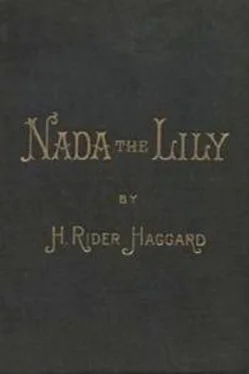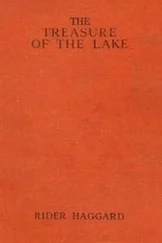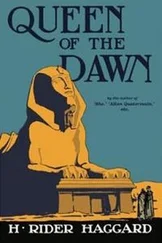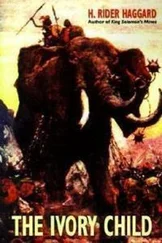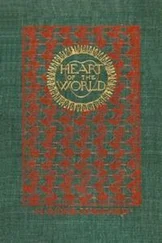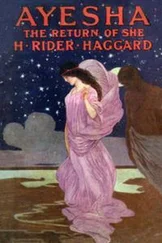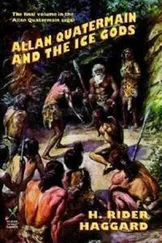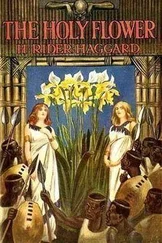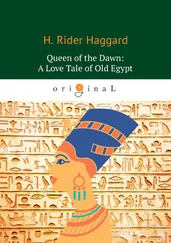Then a Zulu spoke, who hitherto had remained silent. He was the driver of the first wagon.
"My father," he said to the White Man, "this is my word. The oxen are lost in the snow. No man knows whither they have gone, or whether they live or are now but hides and bones. Yet at the kraal yonder," and he pointed to some huts about two miles away on the hillside, "lives a witch doctor named Zweete. He is old—very old—but he has wisdom, and he can tell you where the oxen are if any man may, my father."
"Stuff!" answered the White Man. "Still, as the kraal cannot be colder than this wagon, we will go and ask Zweete. Bring a bottle of squareface and some snuff with you for presents."
An hour later he stood in the hut of Zweete. Before him was a very ancient man, a mere bag of bones, with sightless eyes, and one hand—his left—white and shrivelled.
"What do you seek of Zweete, my white father?" asked the old man in a thin voice. "You do not believe in me and my wisdom; why should I help you? Yet I will do it, though it is against your law, and you do wrong to ask me,—yes, to show you that there is truth in us Zulu doctors, I will help you. My father, I know what you seek. You seek to know where your oxen have run for shelter from the cold! Is it not so?"
"It is so, Doctor," answered the White Man. "You have long ears."
"Yes, my white father, I have long ears, though they say that I grow deaf. I have keen eyes also, and yet I cannot see your face. Let me hearken! Let me look!"
For awhile he was silent, rocking himself to and fro, then he spoke: "You have a farm, White Man, down near Pine Town, is it not? Ah! I thought so—and an hour's ride from your farm lives a Boer with four fingers only on his right hand. There is a kloof on the Boer's farm where mimosa–trees grow. There, in the kloof, you shall find your oxen—yes, five days' journey from here you will find them all. I say all, my father, except three only—the big black Africander ox, the little red Zulu ox with one horn, and the speckled ox. You shall not find these, for they have died in the snow. Send, and you will find the others. No, no! I ask no fee! I do not work wonders for reward. Why should I? I am rich."
Now the White Man scoffed. But in the end, so great is the power of superstition, he sent. And here it may be stated that on the eleventh day of his sojourn at the kraal of Zweete, those whom he sent returned with the oxen, except the three only. After that he scoffed no more. Those eleven days he spent in a hut of the old man's kraal, and every afternoon he came and talked with him, sitting far into the night.
On the third day he asked Zweete how it was that his left hand was white and shrivelled, and who were Umslopogaas and Nada, of whom he had let fall some words. Then the old man told him the tale that is set out here. Day by day he told some of it till it was finished. It is not all written in these pages, for portions may have been forgotten, or put aside as irrelevant. Neither has it been possible for the writer of it to render the full force of the Zulu idiom nor to convey a picture of the teller. For, in truth, he acted rather than told his story. Was the death of a warrior in question, he stabbed with his stick, showing how the blow fell and where; did the story grow sorrowful, he groaned, or even wept. Moreover, he had many voices, one for each of the actors in his tale. This man, ancient and withered, seemed to live again in the far past. It was the past that spoke to his listener, telling of deeds long forgotten, of deeds that are no more known.
Yet as he best may, the White Man has set down the substance of the story of Zweete in the spirit in which Zweete told it. And because the history of Nada the Lily and of those with whom her life was intertwined moved him strangely, and in many ways, he has done more, he has printed it that others may judge of it.
And now his part is played. Let him who was named Zweete, but who had another name, take up the story.
Chapter I.
The Boy Chaka Prophesies
You ask me, my father, to tell you the tale of the youth of Umslopogaas, holder of the iron Chieftainess, the axe Groan–maker, who was named Bulalio the Slaughterer, and of his love for Nada, the most beautiful of Zulu women. It is long; but you are here for many nights, and, if I live to tell it, it shall be told. Strengthen your heart, my father, for I have much to say that is sorrowful, and even now, when I think of Nada the tears creep through the horn that shuts out my old eyes from light.
Do you know who I am, my father? You do not know. You think that I am an old, old witch–doctor named Zweete. So men have thought for many years, but that is not my name. Few have known it, for I have kept it locked in my breast, lest, thought I live now under the law of the White Man, and the Great Queen is my chieftainess, an assegai still might find this heart did any know my name.
Look at this hand, my father—no, not that which is withered with fire; look on this right hand of mine. You see it, though I who am blind cannot. But still, within me, I see it as it was once. Ay! I see it red and strong—red with the blood of two kings. Listen, my father; bend your ear to me and listen. I am Mopo—ah! I felt you start; you start as the regiment of the Bees started when Mopo walked before their ranks, and from the assegai in his hand the blood of Chaka [5] The Zulu Napoleon, one of the greatest geniuses and most wicked men who ever lived. He was killed in the year 1828, having slaughtered more than a million human beings.—ED.
dropped slowly to the earth. I am Mopo who slew Chaka the king. I killed him with Dingaan and Umhlangana the princes; but the wound was mine that his life crept out of, and but for me he would never have been slain. I killed him with the princes, but Dingaan, I and one other slew alone.
What do you say? "Dingaan died by the Tongola."
Yes, yes, he died, but not there; he died on the Ghost Mountain; he lies in the breast of the old Stone Witch who sits aloft forever waiting for the world to perish. But I also was on the Ghost Mountain. In those days my feet still could travel fast, and vengeance would not let me sleep. I travelled by day, and by night I found him. I and another, we killed him—ah! ah!
Why do I tell you this? What has it to do with the loves of Umslopogaas and Nada the Lily? I will tell you. I stabbed Chaka for the sake of my sister, Baleka, the mother of Umslopogaas, and because he had murdered my wives and children. I and Umslopogaas slew Dingaan for the sake of Nada, who was my daughter.
There are great names in the story, my father. Yes, many have heard the names: when the Impis roared them out as they charged in battle, I have felt the mountains shake and seen the waters quiver in their sound. But where are they now? Silence has them, and the white men write them down in books. I opened the gates of distance for the holders of the names. They passed through and they are gone beyond. I cut the strings that tied them to the world. They fell off. Ha! ha! They fell off! Perhaps they are falling still, perhaps they creep about their desolate kraals in the skins of snakes. I wish I knew the snakes that I might crush them with my heel. Yonder, beneath us, at the burying place of kings, there is a hole. In that hole lies the bones of Chaka, the king who died for Baleka. Far away in Zululand there is a cleft upon the Ghost Mountain. At the foot of that cleft lie the bones of Dingaan, the king who died for Nada. It was far to fall and he was heavy; those bones of his are broken into little pieces. I went to see them when the vultures and the jackals had done their work. And then I laughed three times and came here to die.
All that is long ago, and I have not died; though I wish to die and follow the road that Nada trod. Perhaps I have lived to tell you this tale, my father, that you may repeat it to the white men if you will. How old am I? Nay, I do not know. Very, very old. Had Chaka lived he would have been as old as I. [6] This would have made him nearly a hundred years old, an age rarely attained by a native. The writer remembers talking to an aged Zulu woman, however, who told him that she was married when Chaka was king.—ED.
None are living whom I knew when I was a boy. I am so old that I must hasten. The grass withers, and the winter comes. Yes, while I speak the winter nips my heart. Well, I am ready to sleep in the cold, and perhaps I shall awake again in the spring.
Читать дальше
